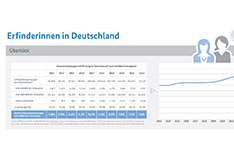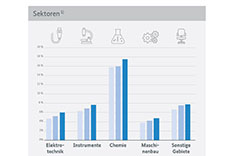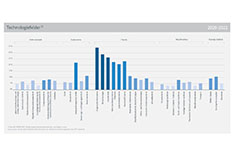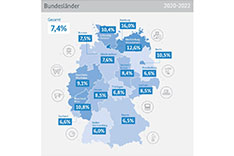Content
More and more women inventors in Germany

Increase in the share of women inventors in Germany, albeit at a very slow rate – German Länder ranking: Hamburg at the top and Baden-Württemberg at the bottom – DPMA President: “There are great women inventors, but we need a lot more of them” – DPMA website series on successful women inventors, designers and trade mark proprietors
Press release of 25 April 2023
Munich. The contribution of women to the innovative capacity in Germany is growing – yet the share of women inventors continues to be small. Ten years ago, in Germany, 6% of the persons designated as inventors in published patent applications were women. Last year, the share was 7.6%. At 7,292, the absolute number of designations of women in 2022 was considerably higher than the 5,477 designations seen in 2013 (+33.1%). The technology sector “Chemistry” had by far the biggest share of women inventors; the “Mechanical engineering” sector had the smallest share. In the German Länder ranking, the share of women inventors was biggest in Hamburg and smallest in Baden-Württemberg, according to a study conducted by the German Patent and Trade Mark Office (DPMA) on the occasion of World Intellectual Property Day. The World Intellectual Property Organization in Geneva has chosen “Women and IP – Accelerating innovation and creativity” as this year’s theme of World Intellectual Property Day, which is celebrated on April 26th.
-
 Infographic "Women Inventors in Germany" (in German)
Infographic "Women Inventors in Germany" (in German)
DPMA President: "A large part of our innovative potential is untapped"
"In Germany, there are many great women inventors, but we need a lot more of them,” DPMA President Eva Schewior said, adding: “Things are heading in the right direction, but the progress we make in the participation of women in the innovation process is too slow. Hence, a large part of our innovative potential is untapped. International comparisons show that other countries have significantly more success in this respect."
To conduct the analysis, we have considered published patent applications with effect in Germany at the DPMA and at the European Patent Office. Patent applications are published after 18 months. Accordingly, the analysis does not include inventions newly filed in 2022. In each patent application, the inventors are designated. We have counted the number of designations of the inventor and, on the basis of an international first name database, assigned them to a sex.
Most women inventors are active in the chemistry sector, the fewest in mechanical engineering
In the past ten years, all technology sectors have seen a continuously increasing share of women inventors. In the last three years, the percentage of women inventors was 17.7% in the "Chemistry" sector, far ahead of the "Other fields" sector (7.8%), which combines inventions concerning furniture, games, consumer goods and building. The following places went to "Instruments" (7.7%), “Electrical engineering” (6%) and “Mechanical engineering” (4.8%).
With respect to the fields of technology at the next lower level, it can be stated that women inventors were scarcely designated in classic mechanical engineering fields such as “Engines, pumps, turbines” and “Mechanical elements” (3.3% each). By contrast, in fields of technology such as “Organic fine chemistry” (34.5%) and “Biotechnology” (29%), women inventors accounted for up to a third of the designations.
This distribution also provides important information concerning the German Länder rankings for 2020 to 2022: In Hamburg, which ranked first with a share of women inventors of 16%, there was a considerable share of applications from the chemistry sector, while in Bavaria and Baden-Württemberg, where the share of women inventors was significantly lower (6.5% and 6%, respectively), most applications were filed in the field of mechanical engineering; the chemistry sector only accounted for a minor share of the applications.
"Leaky pipeline": We lose women's potential from their studies to the patent application
It is remarkable that the phenomenon described internationally as leaky pipeline occurs in Germany too: In the period between gaining professional qualification and engaging in successful innovation activity, many women fall by the wayside – even in Germany. According to the ![]() Federal Statistical Office of Germany, 34% of the master’s graduates in STEM subjects (science, technology, engineering, mathematics) in 2020 were women. Recently, the
Federal Statistical Office of Germany, 34% of the master’s graduates in STEM subjects (science, technology, engineering, mathematics) in 2020 were women. Recently, the ![]() share of women in research and development was at least 28.1%, whereas it was only 15% in the private sector. According to the available analysis, this share was even considerably smaller among inventors.
share of women in research and development was at least 28.1%, whereas it was only 15% in the private sector. According to the available analysis, this share was even considerably smaller among inventors.
DPMA online series starts with three successful women inventors
Nevertheless, in many areas, women today set standards in innovation and creativity – as inventors, designers and entrepreneurs with successful brands. On the occasion of World Intellectual Property Day, the DPMA starts a series on its website to turn the spotlight on these successful women. The series starts with three female inventors from the Bremen area. You will get to know interesting characters and learn a lot about a new procedure for cancer diagnosis, very high-yielding potato plants and innovative sustainable materials. In the next weeks, the series will present fascinating women from other regions in Germany. Have a look!
The German Patent and Trade Mark Office
Inventiveness and creativity need effective protection. The DPMA is the German centre of expertise for all intellectual property rights – patents, utility models, trade marks and designs. As the largest national patent office in Europe and the fifth largest national patent office in the world, our office stands for the future of Germany as a country of inventors in a globalised economy. Its staff of just under 2,800 at three locations – Munich, Jena and Berlin – provide services to inventors and companies. They implement federal innovation strategies and develop the national, European and international protection systems further.
Picture 1: iStock.com/drafter123
Last updated: 25 April 2023





Social Media